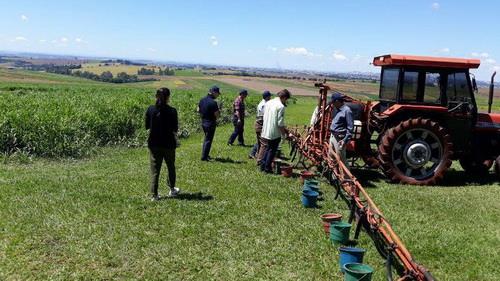3/1/2018 12:00:00 AM - 11:40
Code: 735
Print
Share
FAO assists Iran to strengthen sustainable growth of oilseed crops

Irna News Agency
Food and Agriculture Organization of the United Nations (FAO) is organizing a two-week (19 February - 2 March 2018) special training course in Brazil for the top Iranian experts in the field of agriculture to improve the existing national knowledge on oilseed production and strengthen its capacity in the country, it said.
'This training course would enable the Iranian scientists to 'shadow' experienced Brazilian counterparts in Brazil, and gain hands-on learning opportunities besides enabling them to discuss and understand the applications of innovations in their area of subject matter discipline' said Rao Matta, FAO Representative ad interim to the Islamic Republic of Iran.
By underscoring the knowledge and technology owned by Brazilian research institutions and agencies, namely Foundation For Research And Development Support of Brazil (FAPED) as well as Embrapa (The Soybean Research Center of Brazil), which can enhance the Iranian know-how on soybean production and encourage the national scientists to gain expertise in applied research for development, Matta said that FAO's ultimate objective of this training program is to accelerate soybean production in the country and assist Iran to become one of the leading soybean producers in the region.
'Currently FAO is implementing a Technical Cooperation Project (TCP) in the country entitled 'Building Capacity toward Sustainable Intensification of Oilseed Crops in Iran, addressing the Soybean Value Chain' that aims to catalyze a national effort to build public and private sector capacity to harness and tune innovations in sustainable oilseed crop production and its utilization along each value chain, while integrating the new technologies into cereal-based systems.'
According to the FAO Representation in Iran, the Organization's project also supports 'institutional innovations' by fostering multi-stakeholder alliances through a new steering committee that includes professionals from major oilseed crops with particular emphasis on soybean. Similarly, it will facilitate the creation of an Advisory Board/Council for the oilseed crop sub-sector, including participation of one or more international experts to ensure strategic alliances with research and development institutions outside of Iran.
As Iran imports approximately 95% of its vegetable oil and protein cake, throughout the project, FAO eases strategic mentoring and access to the new genetic resources via a partnership with Embrapa that will bring short- and long-term benefits to the country and considered as a 'jump-starting' of the national capacities in oil seed production.
